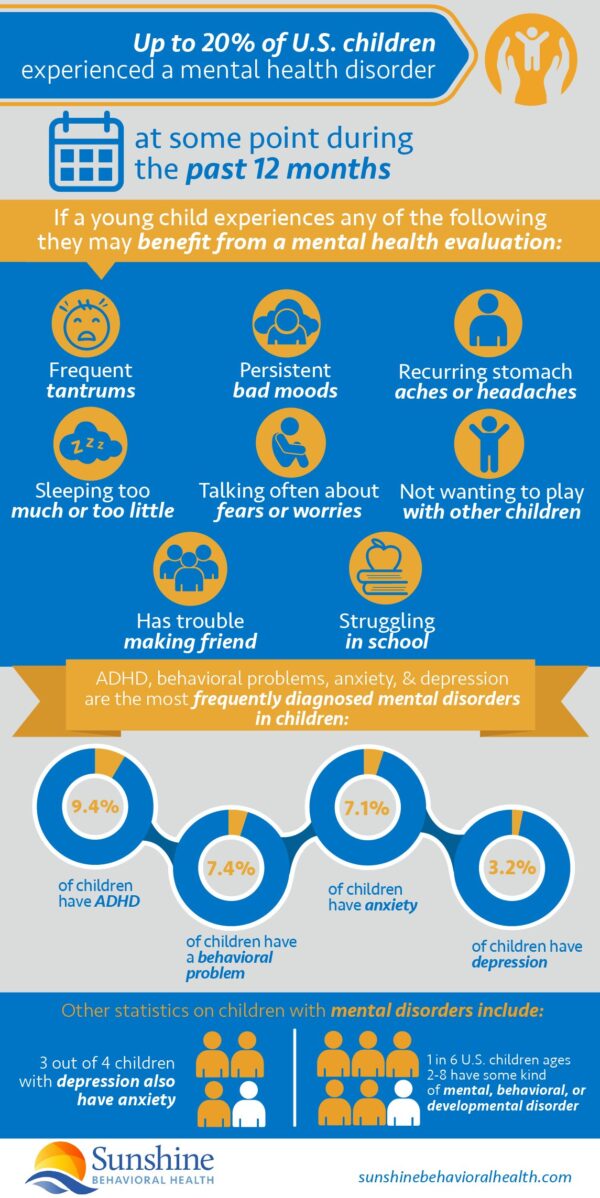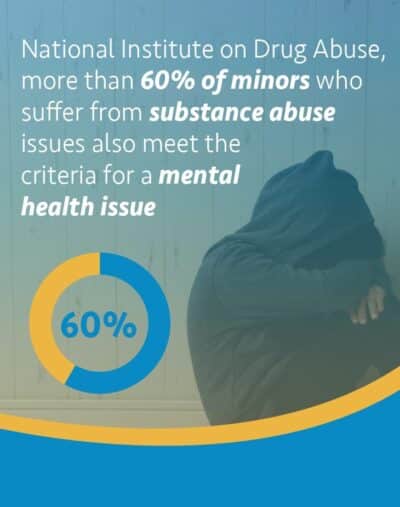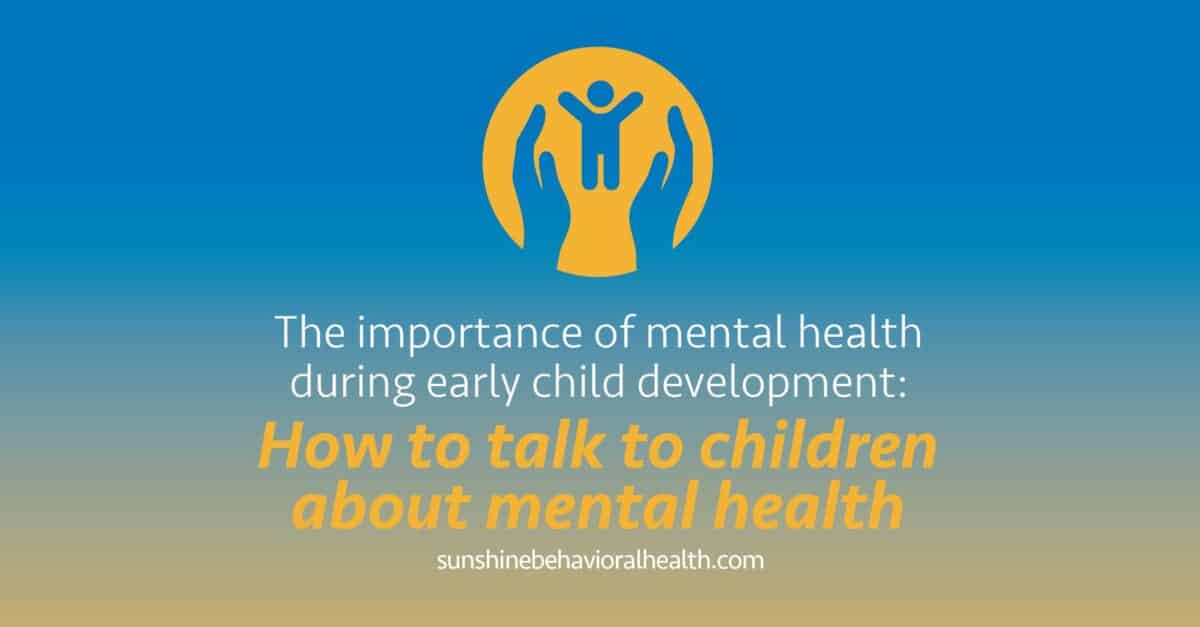In recent years, more attention has been paid to mental health issues. That includes children’s mental health.
To reach important developmental and emotional milestones and learn healthy social skills, children need to be healthy, mentally and emotionally. This helps them cope with challenges, obstacles, and problems as they continue to grow.
When children are mentally healthy, they may function better at home, at school, and in their communities. If they have mental health issues, however, it can have a dramatic impact on the way they handle their emotions, behave around their peers, and learn in the classroom.
Serious emotional distress makes it difficult for children to get through the day.
Even though it’s normal for children to occasionally experience fears, worries, and anxieties, persistent and serious symptoms can interfere with their development. This can lead to a mental health issue.
Mental health issues among children are far more common than many people realize.
According to information that has been published by the National Research Council and Institute of Medicine, up to 20% of children living in the United States have experienced a mental health disorder at some point during the past 12 months. These disorders cost the country, families, and individuals close to $250 billion per year.
Many people believe that the absence of a diagnosed mental disorder is the same as being mentally healthy. This is not always the case. Mental health is not binary—good or bad, black or white—but a continuum, with many shades of gray.
Diagnosed mental health issues need to be treated, but it is also necessary to proactively promote positive mental health among children. In this manner, it is possible to understand how well children are doing as they grow and develop into teenagers and young adults.

Mental Health Issues in Young Children
Young children process emotional experiences and traumatic events in a very different manner than adults and teenagers. This may make it difficult to diagnose their mental health issues and create a barrier to effective mental healthcare.
Mental health issues in young children can also lead to serious consequences for social competence, early childhood development, and lifelong physical health.
Young children can show symptoms of:
- Depression
- Conduct disorder
- Anxiety disorders
- Attention-deficit/hyperactivity disorder (ADHD).
- Post-traumatic stress disorder (PTSD)
- Neurodevelopmental issues.
Early Childhood Development: Nature and Nurture
The development of mental health issues during early childhood is not a product of genetics alone. Impairment in mental health can result from genetic predispositions, exposure to significant adversity during the early childhood years, or both.
Even though genetics can predispose someone to the development of mental health issues, they do not represent someone’s destiny.
Our genes tell our bodies how to work, but it is the environment that either authorizes or prevents those genetic instructions from being carried out. The environment can even speed up or slow down certain types of genetic activity. If it is filled with stress, that can change how our genes are expressed.
The environment can create either:
- A stable foundation for healthy childhood development.
- An unstable foundation that could lead to the progression of serious mental health issues during the early childhood years.
Toxic Stress’s Impact on Early Childhood Mental Health
Even though the ability to connect with everyone at any time does have its benefits, it also can create an environment that is a pressure cooker. Many people do not realize just how much stress this can create for young children.
Toxic stress in the lives of young children can lead to the development of serious mental health problems. Toxic stress develops when strong, frequent, and biological responses to adverse events damage the architecture of the young developing brain.
In some situations, mental health issues can develop rapidly. In other situations, they may take years to manifest. Because of the long-lasting impacts of toxic stress on the development of the young brain, young children can experience impaired academic achievement, delayed school readiness, physical health problems, and the development of serious mental health issues later in life.
Some causes of toxic stress include:
- Persistent poverty
- A lack of childcare
- Unsafe neighborhoods
- Exposure to domestic violence.
Child abuse can also result from a situation that is filled with toxic stress, leading to significant mental, social, and physical health issues immediately and in the future.
A study reported in the journal Pediatrics followed more than 1,000 children for 15 years. It found that children who experienced adverse childhood events (ACEs) before the age of five were far more likely to have academic difficulties in the classroom.
Some of the most common examples of adverse childhood events include:
- Physical abuse.
- Sexual abuse.
- Psychological abuse.
- Neglect.
- Household dysfunction.
- Incarcerated parents.
- Substance use disorder.
According to the study, more than half of these children suffered at least one adverse childhood experience.
Almost one out of every eight children experienced three or more ACEs. The more ACEs, the more likely they were to have delayed literacy skills, below-average language skills, and attention issues.
These children were also more likely to exhibit aggressive behavior when compared to children who did not have any ACEs. Traumatic experiences during early childhood can have wide-ranging impacts on the development of mental health.
Poor Mental Health Linked to Physical Health Issues
Even though it is important to examine the impacts of traumatic experiences and poor mental health on emotional well-being, they can also lead to physical health issues. A study published in Childhood Obesity found that ACEs during the infant and toddler years can lead to a litany of physical health issues.
The research took place over 11 years and collected information on more than 1,300 children. Data was collected via family interviews and observational periods. When the children were 11 years old, researchers updated their health status, height, weight, and other parameters of each child.
Some of the most common examples of adverse childhood experiences in this study included sexual abuse, physical abuse, and emotional abuse.
The researchers discovered a close association between adverse childhood events and physical health issues. Children who experienced adverse childhood experiences were more likely to develop respiratory problems, obesity issues, and poor overall health ratings.
Children who experienced four or more adverse childhood experiences were far more likely to have the poorest health ratings. They were twice as likely to develop each of the listed health problems when compared to children who did not experience any adverse childhood experiences.
Poor mental health during early childhood years can lead to significant physical health issues. Because children who are obese are more likely to remain overweight into adulthood (compared to children who grow up at a healthy weight), it is critical to focus on the mental health of children even during early childhood.
Children who have a safe, welcoming, and nurturing environment are far less likely to develop physical health problems.
What Are the Most Common Childhood Mental Health Issues?
 Mental health issues in young children are diagnosed when they lead to serious changes in the way children learn, behave, and control their emotions. Such disorders can result in serious distress, creating problems even getting through the day.
Mental health issues in young children are diagnosed when they lead to serious changes in the way children learn, behave, and control their emotions. Such disorders can result in serious distress, creating problems even getting through the day.
Mental health issues are diagnosed using the American Psychiatric Association’s Diagnostic and Statistical Manual of Mental Disorders, Fifth Edition (DSM-5). Disorders in young children come in many shapes and forms. Some of the most common examples include:
Anxiety
Common signs of anxiety in young children include:
- Separation anxiety, or fears when children are separated from their parents.
- Phobias, or extreme fears about a specific situation.
- Social anxiety, or being afraid of school and other locations where others might be present.
- Panic attacks, with a racing heart, difficulty breathing, or dizziness.
Depression
Some of the most common symptoms of depression include:
- Feeling irritable, sad, or hopeless a significant amount of the time.
- Avoiding activities that used to bring significant pleasure and joy.
- Noticeable changes in eating patterns, either eating more or less.
- Significant changes in sleep patterns, either sleeping more or less.
- Showing self-injurious or self-destructive behaviors.
Oppositional Defiant Disorder
Some of the most common symptoms of oppositional defiant disorder (ODD) include:
- Frequent angry outbursts and temper tantrums.
- Exhibiting resentful and spiteful behavior.
- Deliberately lashing out at other people when unprovoked.
- Consistent refusal to comply with rules that have been set by authority figures.
Post-Traumatic Stress Disorder
Some of the most common symptoms of post-traumatic stress disorder (PTSD) include:
- Flashbacks to the specific event.
- Nightmares and sleep issues.
- Ongoing fear and sadness.
- Emotional extremes.
- Hypervigilance, or constantly looking out for possible threats.
These are just a few of the most common mental health issues that could manifest during early childhood years. Parents need to know what to do if they believe their child is experiencing mental health issues. Fortunately, there are resources available.
Mental Health Disorders May Lead To Substance Use Disorder
According to information that has been published by the National Institute on Drug Abuse, more than 60% of minors who suffer from substance use disorder issues also meet the criteria for a mental health issue. Unchecked, mental health issues can lead to substance use disorder disorders and vice versa.
Young brains are still developing, which makes them more vulnerable to substance use disorder issues. Therefore, it is critical to accurately diagnose and treat mental health issues in children as early as possible.
Communication can play a vital role, especially when informing children about mental health and mental illness.
Talking To Children About Mental Health
Some parents may feel uncomfortable talking to their children about mental health issues. This is a delicate topic, so it is important to approach it carefully.
Some tips to keep in mind include:
- Try to communicate information straightforwardly. Do not beat around the bush. Make sure the child knows what you are trying to talk about.
- Consider the age of the child. Communicate at a level that is appropriate for the developmental stage of the child.
- Try to pick a comfortable time to discuss this topic. Keep an eye on the reactions of the child and adjust as needed. If you notice the child is starting to look upset, then slow down, back up, and ask questions.
Following these tips can help parents have a productive discussion about the importance of mental health in children.
Mental Health During Early Childhood Development
It is always important to tailor the treatment plan to the individual situations of each patient, including young children. Even though there are situations where prescription medications may prove helpful, the foundation of mental health treatment in young children is therapy.
The earlier these issues are diagnosed, the faster they can be treated and the better the prognosis. This could also go a long way toward improving the prognosis of children who are diagnosed with a mental health issue.
If you are looking for resources that can help you address mental health issues during early childhood development, do not hesitate to reach out to a trained professional.
Parents can start by reaching out to their primary care physician (PCP) for more information. PCPs can refer them to a mental health specialist who works with young children as well as other resources.
In the end, parents need to understand the importance of mental health in early childhood development. If these issues are left unchecked, they could lead to long-term developmental disorders.
Resources for Family Members Affected by Addiction
Mental Health Resources for Parents
If you are concerned about the mental health of your child, there are plenty of resources available that can help you locate treatment options. These include:
- Psychologist Locator. This tool has been provided by the American Psychological Association (APA) Practice Organization and can help you and your child find a psychologist who provides the type of specialized care that you need.
- Child and Adolescent Psychiatrist Finder. This is a research tool that has been provided by the Academy of Child and Adolescent Psychiatry (AACAP). It can help you find a psychiatrist who has completed specialized training to work specifically with children during the early childhood years.
- Find a Cognitive Behavioral Therapist. Cognitive behavioral therapy, usually shortened to CBT, is one of the most important treatment tools for mental health issues. This search tool has been provided by the Association for Behavioral and Cognitive Therapies to help parents and caregivers find a therapist in their area.
- MentalHealth.gov. This link can help you locate treatment facilities in the area. Then, you can compare the benefits and drawbacks of various options, review them with your mental health provider, and decide on an appropriate course of action for your child.
These are just a few of the many resources that you may want to explore if you are looking for assistance for your child. Some of the other links that you may wish to check out include:
- Centers for Disease Control
- National Institute of Mental Health
- Children’s Mental Health and Emotional or Behavioral Disorders Project
- The Whole Child
- Children’s Mental Health Matters
- Uplift Family Services
Many state, county, and municipal health departments may have resources as well.
Sources
Medical disclaimer:
Sunshine Behavioral Health strives to help people who are facing substance abuse, addiction, mental health disorders, or a combination of these conditions. It does this by providing compassionate care and evidence-based content that addresses health, treatment, and recovery.
Licensed medical professionals review material we publish on our site. The material is not a substitute for qualified medical diagnoses, treatment, or advice. It should not be used to replace the suggestions of your personal physician or other health care professionals.







